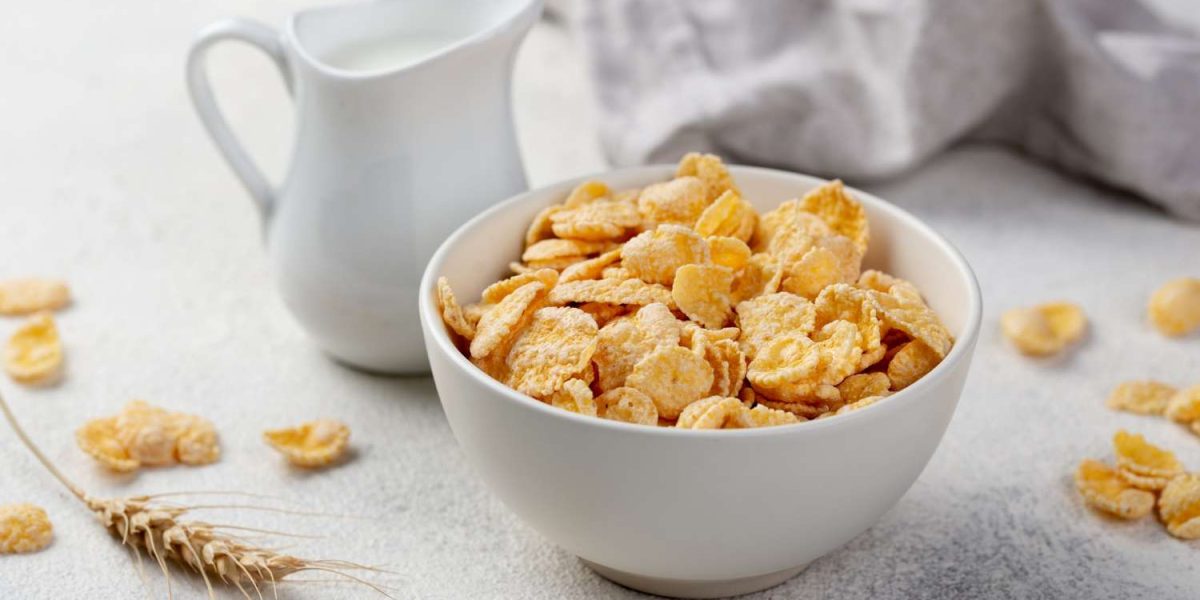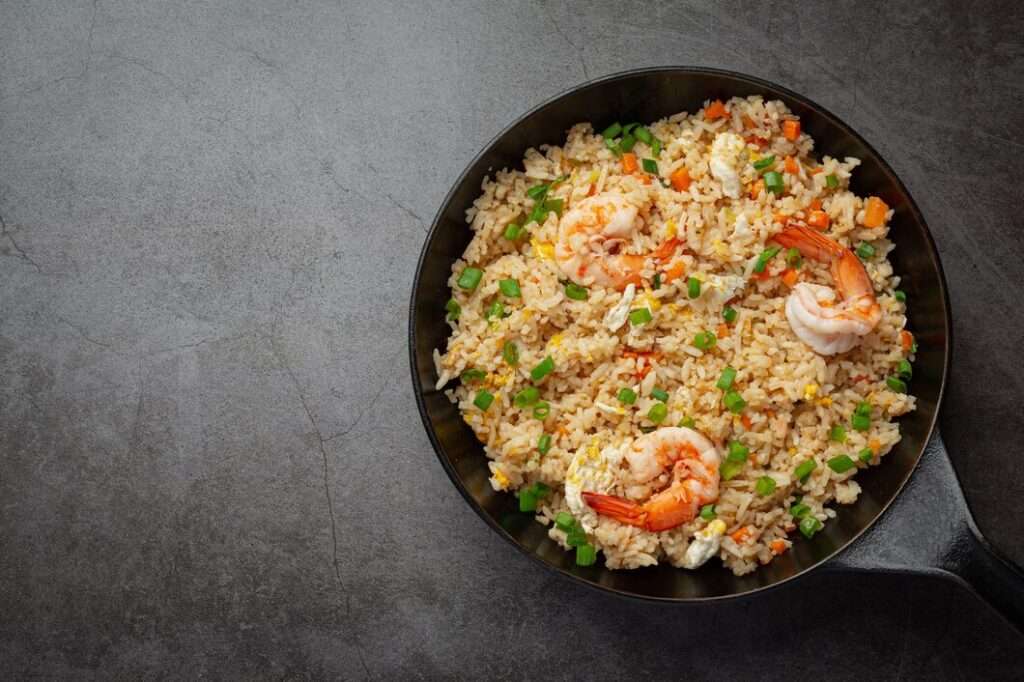Table of Contents
Contrary to popular belief, cornflakes can contribute to weight loss in simple terms. Opting for whole grain cornflakes without added sugars offers a low-calorie yet filling breakfast. The fiber content in these cornflakes promotes a sense of fullness, reducing overall calorie intake throughout the day. This helps control cravings and supports weight management efforts.
Despite its perceived lightness, choosing the right kind of cornflakes makes a substantial difference in maintaining a balanced and satisfying diet. So, for those seeking a straightforward and effective addition to their weight loss journey, incorporating whole grain cornflakes into their breakfast routine can be a surprisingly beneficial choice.

Overview of Cornflakes
Cornflakes were accidentally discovered by Dr. Kellogg in the late 1800s. They’re made by cooking corn, flattening it, and toasting to create the crispy flakes we know. You can find different types: classic ones, flavored with honey or fruit, and fortified with extra nutrients.
For better health, choose whole-grain cornflakes. Whole grain means they keep more of the good stuff like fiber, vitamins, and minerals. This helps with digestion, keeps you energized, and supports weight management. So, when picking cornflakes, going for the whole-grain option adds extra benefits to your breakfast, making it a healthier and more balanced choice.
Nutritional Value of Cornflakes:
Cornflakes primarily consist of carbohydrates, providing a quick source of energy. They are low in protein and fat but can contribute to a balanced diet. While they offer minimal fiber, choosing whole-grain variations enhances this content. However, be cautious of added sugars, as some flavored options may increase sugar levels.
Fortified cornflakes often contain essential vitamins like B vitamins (B12, folic acid) and minerals such as iron and zinc. These additions can boost nutritional value, especially for those with specific dietary needs.
When comparing to other breakfast options, cornflakes may have fewer protein and fiber benefits than alternatives like oatmeal or whole-grain cereals. Mixing cornflakes with fruits, nuts, or yogurt can enhance their nutritional content and make for a more well-rounded breakfast choice.
Benefits of Cornflakes
1. Dietary Fiber for Digestive Health:
Cornflakes, especially whole-grain varieties, are a good source of dietary fiber. Fiber aids digestion, promotes regular bowel movements, and contributes to overall gut health.
2. Quick and Convenient Breakfast Option:
Cornflakes provide a quick and easy breakfast solution. They require minimal preparation, making them a convenient choice for individuals with busy lifestyles.
3. Vitamins and Minerals Boost:
Fortified cornflakes often contain essential vitamins and minerals such as B vitamins, iron, and zinc. These additions enhance the nutritional profile, supporting overall health.
4. Weight Management Support through Satiety:
The fiber content in cornflakes promotes a feeling of fullness, helping control appetite and potentially supporting weight management when consumed as part of a balanced diet.
5. Versatility in Culinary Usage:
Cornflakes can be versatile in the kitchen, adding texture and flavor to various dishes. From yogurt parfaits to salads, their adaptability allows for creative and nutritious meal options.
While enjoying these benefits, it’s important to be mindful of portion sizes, opt for whole-grain varieties, and consider individual dietary needs for a well-rounded and healthy approach to incorporating cornflakes into your diet.
Connection Between Cornflakes and Weight Loss
Cornflakes are not a magical weight-loss solution, as some believe. While they are convenient, their effectiveness depends on how they fit into a balanced diet. Portion control is crucial, ensuring you don’t exceed your daily calorie needs.
It’s essential to watch portion sizes when eating cornflakes to avoid overeating.
Being mindful of the overall calorie content of your meals, including cornflakes, is key to successful weight loss.
Benefits for Weight Management:

Fiber Content:
- Cornflakes contain fiber, which helps you feel full and satisfied.
- This can reduce the likelihood of overeating and snacking between meals.
Low Fat:
- Cornflakes are typically low in fat, making them a good option for those watching their calorie intake.
- By choosing low-fat options, you can reduce your overall calorie consumption, which is essential for weight loss.
Versatility:
- Cornflakes can be paired with a variety of nutritious foods to create balanced meals.
- Adding fruits, nuts, or yogurt to your cornflakes can increase their nutritional value and make them more satisfying.
In conclusion, while cornflakes can be part of a healthy diet and may aid in weight management, it’s important to approach them with moderation and balance. Pairing them with other nutritious foods and being mindful of portion sizes can help you achieve your weight loss goals more effectively.
Healthy Ways to Incorporate Cornflakes:
Yogurt Parfaits with Fruit and Nuts:
- Start with a layer of cornflakes at the bottom of a glass.
- Add a generous portion of low-fat yogurt on top.
- Top it off with a colorful mix of fresh fruits such as berries, and sprinkle some nuts for added crunch.
- This parfait provides a delightful combination of textures and a balanced blend of carbohydrates, protein, and healthy fats.
Smoothie Bowls with Protein Powder and Leafy Greens:
- Blend a nutritious smoothie using protein powder, leafy greens like spinach or kale, and your choice of liquid (milk or a dairy-free alternative).
- Pour the smoothie into a bowl and sprinkle a layer of cornflakes on top.
- This smoothie bowl offers a refreshing and fiber-rich breakfast, combining the goodness of greens with the satisfying crunch of cornflakes.
Low-Fat Milk and Berries Mixed with Cornflakes:
- Combine cornflakes in a bowl with low-fat milk.
- Add a mix of fresh berries such as strawberries and blueberries.
- The blend of low-fat dairy, fiber-rich cornflakes, and antioxidant-packed berries creates a quick and wholesome breakfast option.
Savory Salads with a Sprinkle of Cornflakes:
- Use cornflakes as a crunchy topping for your favorite savory salads.
- The slight sweetness of cornflakes complements the savory elements of the salad, providing a unique texture and flavor.
- A nutritious way to add an unexpected twist to your lunch or dinner.
Banana-Cocoa Cornflake Muffins:
- Mash ripe bananas and mix them with cocoa powder and cornflakes to create a muffin batter.
- Bake the mixture into muffins for a delightful breakfast or snack option.
- These muffins offer a balance of sweetness from bananas, the richness of cocoa, and the crunchiness of cornflakes.
These detailed recipes showcase the versatility of cornflakes, providing not only a variety of flavors but also a range of nutrients for a wholesome and enjoyable breakfast.
Pros and Cons of Cornflakes:
Pros:
- Affordable and Readily Available:
Cornflakes are budget-friendly and widely accessible, making them a convenient breakfast option for many.
- Good Source of Fiber and Essential Nutrients:
Whole-grain cornflakes offer dietary fiber, promoting digestive health and providing essential nutrients like vitamins and minerals.
- Versatile and Can be Incorporated Into Various Dishes:
Cornflakes serve as a versatile ingredient, adding crunch to parfaits, smoothie bowls, salads, and more, enhancing the overall dining experience.
- Can Promote Satiety and Aid in Weight Management:
The fiber content in cornflakes helps with satiety, making them a potentially satisfying part of a balanced diet that supports weight management when consumed mindfully.
Cons:
- High in Carbohydrates, Can Lead to Blood Sugar Spikes if Eaten Alone:
Cornflakes have a high carbohydrate content, which, if consumed in large quantities or without balancing proteins and fats, may cause rapid spikes in blood sugar levels.
- Often Processed and Can Contain Added Sugars and Unhealthy Fats:
Some commercially available cornflakes are processed and may contain added sugars and unhealthy fats, impacting their nutritional quality.
- Low in Protein, May Not be Sufficient for a Complete Meal:
Cornflakes lack substantial protein, which is crucial for a balanced meal. Depending on individual dietary needs, pairing them with protein-rich foods is essential to create a more wholesome and filling meal.
Understanding these pros and cons allows individuals to make informed choices about incorporating cornflakes into their diet while considering overall nutritional balance.
Summary
In summary, cornflakes can be part of a weight-loss strategy when approached mindfully. Key considerations include portion control, calorie balance, and integrating cornflakes into a broader, nutrient-rich diet. While they offer fiber for satiety, it’s essential to be aware of potential pitfalls like added sugars and low protein content. Cornflakes should not be seen as a standalone solution but rather as a versatile ingredient that can enhance meals.
FAQs:
1. Can I eat cornflakes for Weight Loss?
Yes, you can eat cornflakes as part of a weight-loss diet. Opt for whole-grain varieties, practice portion control, and balance them with other nutritious foods to support a well-rounded approach to weight management.
2. Is It Okay to Eat Cornflakes Everyday?
Eating cornflakes every day is fine, but it’s crucial to vary your diet for overall nutritional balance. Ensure you choose whole-grain options, be mindful of added sugars, and incorporate a diverse range of foods to meet your nutritional needs.
3. Which is better? Oats or Cornflakes?
Oats are generally considered a healthier option due to their higher fiber and protein content. They provide sustained energy and greater satiety compared to cornflakes. However, both can be part of a healthy diet when chosen wisely and balanced with other nutrient-rich foods.
4. What is the Nutritional Value of Cornflakes?
The nutritional value of cornflakes includes carbohydrates, minimal protein and fat, and some essential nutrients. Whole-grain cornflakes offer fiber, vitamins, and minerals. However, be cautious of added sugars and choose varieties with minimal processing for better nutritional benefits.
